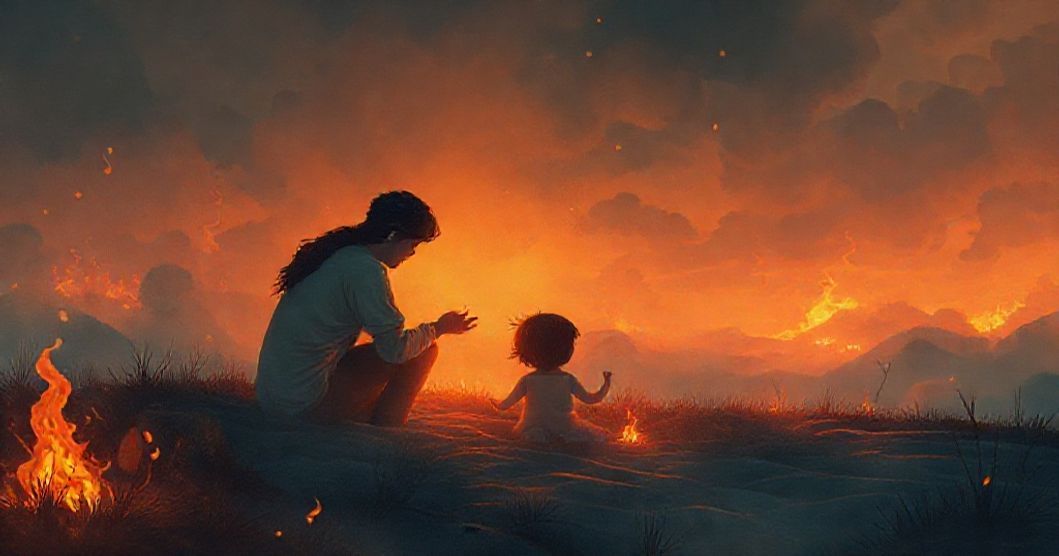Part 1: Dream Presentation
Dreams often serve as emotional barometers, reflecting our deepest anxieties and unprocessed feelings in symbolic form. This particular dream weaves together elements of domestic space, familial relationships, and primal fear, creating a narrative that resonates with universal themes of safety, connection, and vulnerability.
The dream begins in a familiar domestic setting—the dreamer’s apartment shared with their father—transformed into a site of destruction by fire. Flames, smoke, and heat dominate the sensory experience, while the figure chasing the dreamer introduces an element of threat. The dreamer’s attempt to scream for help, only to be silenced, builds tension before transitioning to a second dream where the father’s dismissive reaction to the nightmare mirrors the emotional distance the dreamer may feel in waking life.
The rewritten dream narrative captures these elements vividly: the visceral fire, the inescapable chase, the blocked voice, and the father’s anger and disregard. Together, these components create a psychological portrait of someone navigating fears around safety, connection, and emotional responsiveness.
Want a More Personalized Interpretation?
Get your own AI-powered dream analysis tailored specifically to your dream
🔮Try Dream Analysis FreePart 2: Clinical Analysis
Symbolic Elements of Fire and Pursuit
Fire in dreams universally symbolizes transformation, destruction, or intense emotional energy. In this dream, the apartment fire represents a crisis of safety within the dreamer’s most intimate space—the home shared with their father. The domestic setting is rendered unsafe, suggesting that the dreamer may feel their sense of security is threatened in waking life, perhaps by changes in their relationship with their father or broader life circumstances.
The figure chasing the dreamer is a classic symbolic element of repressed fears or unresolved conflicts. Its indistinct form suggests the dreamer may not yet have clarity about what specifically is pursuing them—whether it’s stress, a relationship issue, or a personal insecurity. The inability to scream, a common dream phenomenon, often reflects feelings of powerlessness or a sense of being unheard in waking life. This "mute scream" is particularly significant, as it mirrors the dreamer’s experience of trying to communicate their fears to their father in the second part of the dream.
Psychological Lenses: Jungian and Freudian Perspectives
From a Freudian perspective, the fire could represent repressed anger or aggression, either toward the father or within the dreamer themselves. The chase might symbolize the dreamer’s attempt to avoid confronting these feelings, while the inability to scream reflects a blockage in expressing emotions. The father’s dismissive reaction in the second dream could mirror the dreamer’s perception of how their father responds to emotional distress in waking life—perhaps minimizing feelings rather than engaging with them.
Jungian psychology offers a complementary view, suggesting the fire as a transformative archetype. In dreams, fire often signifies the purging of old patterns and the birth of new understanding. The father, as a significant figure in the dream, may represent the dreamer’s "shadow" or the parts of themselves they are struggling to integrate. The chase could symbolize the shadow’s attempt to be acknowledged, while the fire represents the necessary destruction of old ways of relating to feel safe.
Emotional Context and Family Dynamics
The dream’s emotional core centers on the tension between safety-seeking and emotional neglect. The dreamer’s desperate attempt to reach their father for protection during the fire, followed by his anger and dismissal when awakened, suggests a pattern in their waking relationship. The father’s reaction—frustration at being woken rather than concern for the dreamer’s distress—may reflect a dynamic where the father is emotionally unavailable or dismissive of the dreamer’s feelings.
This dynamic could stem from various sources: perhaps the father has his own unresolved issues, or the family operates with a "tough it out" philosophy that discourages emotional expression. The dreamer’s experience of feeling unheard in both the nightmare (unable to scream) and the waking-like dream (father dismisses the dream) reinforces a sense of isolation or disconnection, even within a shared physical space.
Therapeutic Insights and Integration
For the dreamer, this dream offers several therapeutic insights. First, recognizing the fire as a symbol of threatened safety can help identify what in their life feels unstable or unsafe. The inability to scream may indicate that they need to find healthier ways to express vulnerability and fear, rather than internalizing these emotions.
The father’s reaction in the second dream is particularly telling—it may be a call to examine how they communicate with authority figures in their life. Journaling exercises could help the dreamer explore: What specific waking situations trigger feelings of being chased or unsafe? How do they typically respond when feeling vulnerable?
Practical steps might include initiating open dialogue with the father about their dreams and feelings, using "I" statements to express needs without blame. Additionally, grounding techniques during moments of anxiety could help the dreamer feel more in control when facing perceived threats, whether real or symbolic.
FAQ Section: Understanding Dream Sequences and Family Reactions
Q: Why did the dream transition from fire to the father being angry?
A: This two-part dream likely represents the dreamer’s internal conflict between needing protection (the fire/fear) and the emotional response they receive (father’s anger). It may reflect how the dreamer perceives their relationship—seeking safety but facing dismissal.
Q: Is the fire a sign of something bad happening in real life?
A: Dreams rarely predict literal events. The fire symbolizes emotional intensity or perceived threats, not a literal disaster. The dreamer should focus on emotional triggers rather than literal predictions.
Q: How can I use this dream to improve my relationship with my dad?
A: Reflect on how you express vulnerability. Initiate calm conversations about your feelings, using specific examples from the dream. Ask for his perspective on communication patterns, creating space for mutual understanding.
